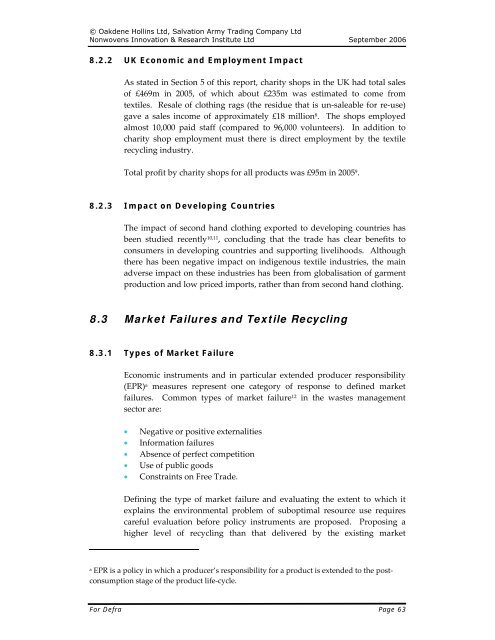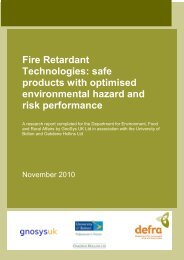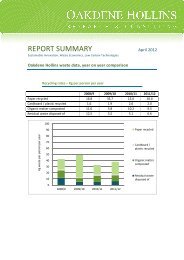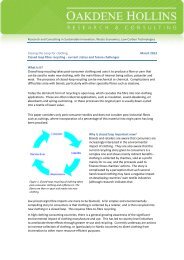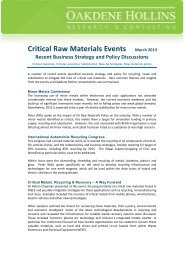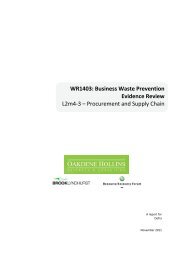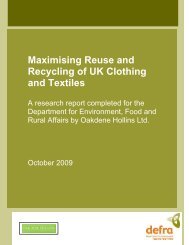Recycling of Low Grade Clothing Waste - Oakdene Hollins
Recycling of Low Grade Clothing Waste - Oakdene Hollins
Recycling of Low Grade Clothing Waste - Oakdene Hollins
Create successful ePaper yourself
Turn your PDF publications into a flip-book with our unique Google optimized e-Paper software.
© <strong>Oakdene</strong> <strong>Hollins</strong> Ltd, Salvation Army Trading Company Ltd<br />
Nonwovens Innovation & Research Institute Ltd September 2006<br />
8.2.2 UK Economic and Employment Impact<br />
As stated in Section 5 <strong>of</strong> this report, charity shops in the UK had total sales<br />
<strong>of</strong> £469m in 2005, <strong>of</strong> which about £235m was estimated to come from<br />
textiles. Resale <strong>of</strong> clothing rags (the residue that is un‐saleable for re‐use)<br />
gave a sales income <strong>of</strong> approximately £18 million 8 . The shops employed<br />
almost 10,000 paid staff (compared to 96,000 volunteers). In addition to<br />
charity shop employment must there is direct employment by the textile<br />
recycling industry.<br />
Total pr<strong>of</strong>it by charity shops for all products was £95m in 2005 9 .<br />
8.2.3 Impact on Developing Countries<br />
The impact <strong>of</strong> second hand clothing exported to developing countries has<br />
been studied recently 10,11 , concluding that the trade has clear benefits to<br />
consumers in developing countries and supporting livelihoods. Although<br />
there has been negative impact on indigenous textile industries, the main<br />
adverse impact on these industries has been from globalisation <strong>of</strong> garment<br />
production and low priced imports, rather than from second hand clothing.<br />
8.3 Market Failures and Textile <strong>Recycling</strong><br />
8.3.1 Types <strong>of</strong> Market Failure<br />
Economic instruments and in particular extended producer responsibility<br />
(EPR) a measures represent one category <strong>of</strong> response to defined market<br />
failures. Common types <strong>of</strong> market failure 12 in the wastes management<br />
sector are:<br />
• Negative or positive externalities<br />
• Information failures<br />
• Absence <strong>of</strong> perfect competition<br />
• Use <strong>of</strong> public goods<br />
• Constraints on Free Trade.<br />
Defining the type <strong>of</strong> market failure and evaluating the extent to which it<br />
explains the environmental problem <strong>of</strong> suboptimal resource use requires<br />
careful evaluation before policy instruments are proposed. Proposing a<br />
higher level <strong>of</strong> recycling than that delivered by the existing market<br />
a<br />
EPR is a policy in which a producer’s responsibility for a product is extended to the postconsumption<br />
stage <strong>of</strong> the product life‐cycle.<br />
For Defra Page 63


